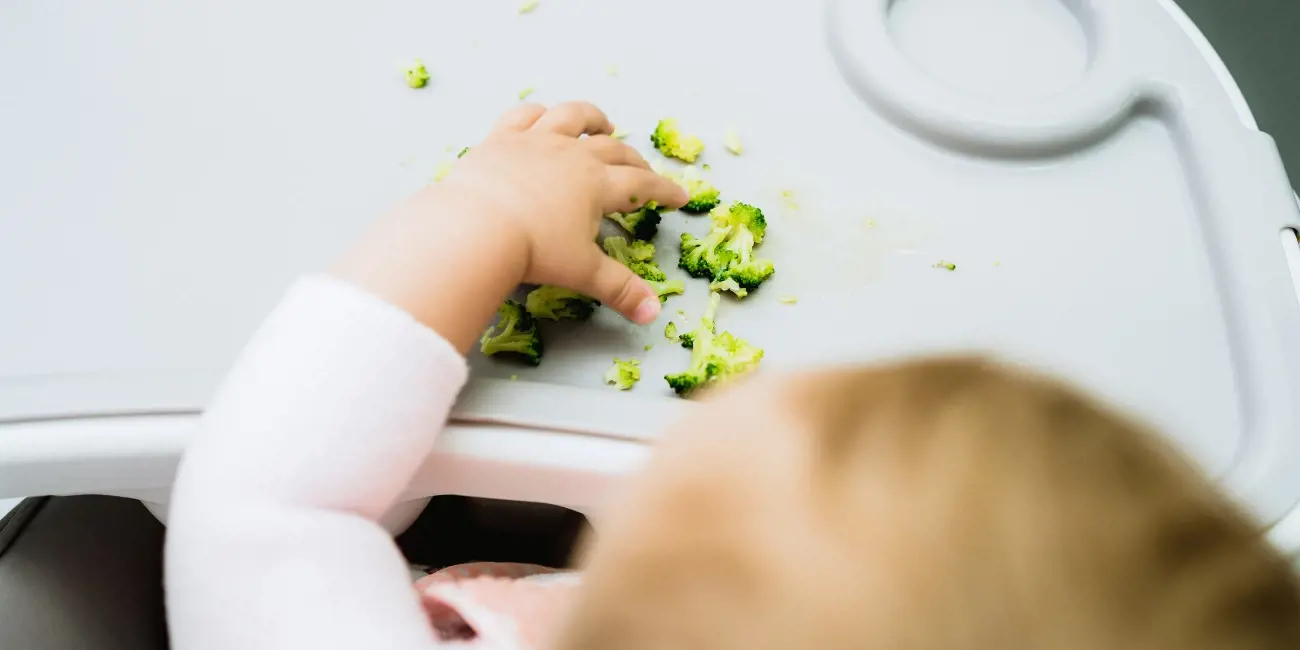For their first months of life, breastmilk and/or formula provide babies with all the nutrients and energy they need, but as little ones grow and develop, a more substantial menu is required.
Things like mashed pumpkin and pureed apple open up a whole new eating experience, giving infants a taste for new foods, a feel for new textures, and vital opportunities to practice chewing and swallowing.
However, as well as powering their bodies and boosting their brains, research indicates that feeding your baby solids earlier can also help them sleep better.
Introducing solids
Over the years, there has been much debate around the age parents should introduce solids to babies.
According to the Department of Health, around six months old is when babies need solid foods added to their liquid diet. This is when they’re likely to show an interest in food, have a bigger appetite, and be able to sit upright with limited support and control their neck and head.
This advice is mirrored internationally, with the UK's NHS suggesting 'complementary feeding' around six months of age as well.
Saying that, solids can be introduced earlier, and although the Australian Department of Health strongly recommends that, 'Solids are not introduced before four months of age, as a baby's system is still immature,' new research has tested this viewpoint.
Sweet dreams are made of solids
Or, more particularly, researchers from the UK and the US have found that the early introduction of solids has a 'small but significant effect' on how well a baby sleeps.
For this study, 1,303 healthy, breastfed three-month-olds were split randomly into two groups. One group was exclusively breastfed until six months, and the other group was given breastmilk and solids (including peanuts, eggs, and wheat) from the age of three months. Researchers then followed the babies’ health and behaviour for three years, with families answering questionnaires about their children's sleep and solid food consumption.
Although the effect was modest, researchers found that the babies who were introduced to solids from three months slept, on average, two hours more a week at six months of age than the babies who were only breastfed. The first group also woke less often at night at six months and had fewer 'very serious sleep problems'.
Experts respond to the research
There has been a mixed reaction to the 'small but significant' correlation between the early introduction of solids and improved sleep.
Professor Amy Brown of Swansea University has responded by saying, 'There is no clear physiological reason why introducing solids foods early would help a baby sleep, especially not for the very small amounts parents were instructed to give in this trial'. She has urged caution and emphasised that the non-waking effect was only seen after the age of five months, despite one group receiving solids from three months.
However, others have been more supportive of the findings. Professor Mary Fewtrell, nutrition lead for the Royal College of Paediatrics and Child Health has welcomed the study and says that in the UK and EU, 'We expect to see updated recommendations on infant feeding in the not too distant future' in terms of the recommendation that solids should not be introduced before four months.
Of course, every baby is different, and Erin Leichman, a senior research psychologist at St Joseph's University, Philadelphia says that the findings around solids and sleep are important and that more research is needed. However, she notes that 'At this point, results of this study do not indicate that solids should be introduced early for all babies. Deciding when to introduce solid foods should be one that is family-based, and made with a trusted health-care provider.'

Starting solids
This study is food for thought, and as things stand, here are the current Department of Health suggestions when it comes to introducing different foods at different ages:
The baby's age Food consistency Examples of food
- Birth to around six months of Liquid Breast milk and/or infant formula
- Six to seven months Finely mashed or pureed foods (no added salt, sugar, fat, or another flavour) Breast milk and/or infant formula
- Infant cereal
- Smooth mashed pumpkin, potato, or zucchini
- Smooth-cooked apple or pear
- Well-cooked pureed liver or meat
- Eight to 12 months Mashed or chopped foods and finger foods (no flavour added) Breast milk and/or infant formula
- Infant cereal
- Well-cooked and mashed/minced fish, minced liver or finely shredded meat, chicken or egg
- A variety of mashed or soft-cooked veggies. e.g. broccoli
- Mashed cooked fruit
- Chopped soft raw fruit e.g. banana or melon
- Cereals, e.g. rice, oats, bread, pasta
- Nine to 12 months Same as for 12 months, plus cheese, custards and yoghurt
- One year and over Family foods Breast milk and/or plain pasteurised full-cream milk
- Different flavoured and textured foods from all the food groups
Whether they're four months or 12 months, make sure you always supervise infants when they’re eating, due to the risk of choking, and here’s to happy days and restful nights.
Childcare support
Early childhood education and care can play a significant role in introducing solids to children in childcare settings. Early childhood education and care (ECEC) educators can support and facilitate the introduction of solids to your child.
Educators are trained in child development, including nutrition, and feeding practices. They have the knowledge and expertise to understand the developmental stages of children and can provide appropriate guidance for introducing solids based on each child's age, readiness, and individual needs.
Educators can introduce solids gradually, following a recommended timeline for introducing specific food groups. They can start with simple purees or mashed foods and slowly progress to more textured foods as children develop their chewing and swallowing skills. Educators can monitor children's progress and adjust the food texture and consistency accordingly.
Modelling and social interaction
Children often learn by observing others. Childcare offers the opportunity for children to have role models in their peers and early childhood educators can also model healthy eating habits and positive mealtime behaviours, such as sitting together at a table, using appropriate table manners, and engaging in conversation during meals.
Each child may have different preferences, dietary restrictions, or developmental readiness when it comes to introducing solids. Educators can take an individualised approach, considering each child's unique needs, and work closely with parents or caregivers to align their efforts in introducing solids both at the childcare service and at home.
Reference



































